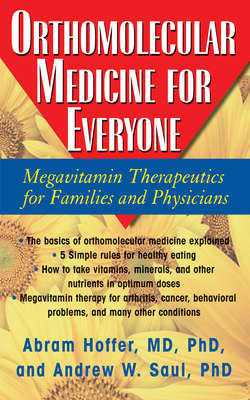Читать книгу Orthomolecular Medicine for Everyone - Abram Hoffer M.D. Ph.D. - Страница 36
На сайте Литреса книга снята с продажи.
TYPES OF FOOD SUPPLEMENTS
ОглавлениеVitamins are organic molecules necessary for a large variety of chemical processes that occur in every tissue of the body, including the brain. For example, it has been found that vitamin C and niacinamide have a direct relationship with receptors in the brain. By definition, vitamins cannot be made in the body, are required in very tiny amounts, and serve to catalyze reactions in the body.
A few vitamins do not meet this definition but have been thought of as vitamins for so long that it is hardly likely they will ever be reclassified. Ascorbic acid is required in large or gram doses, which is not characteristic of a vitamin, nor should it be so considered, according to some researchers.10 Niacin and niacinamide can be made in the body; about 60 milligrams (mg) of tryptophan will yield 1 mg of vitamin B3 by means of the nucleotide cycle. Therefore, B3 is by a very strict definition not exactly a vitamin. Vitamin D3 is made in the skin by the influence of ultraviolet light and should not be listed as a vitamin. It is more aptly looked upon as a hormone. Perhaps the whole vitamin concept should be dropped and each vitamin be designated by its name only or as an accessory factor or food supplement. The vitamin concept has served its purpose, but today it is detrimental to orthomolecular nutrition and to medicine.
Minerals are divided into two main classes: toxic (such as mercury) and essential trace minerals (such as selenium or zinc). No mineral can be generated in the body—all have to be provided by our water and food.
“Vitamin supplements are safe. I have never seen a serious reaction to vitamin supplements. Since 1969, I have taken over two tons of ascorbic acid myself. I have put over 20,000 patients on bowel tolerance doses of ascorbic acid without any serious problems, and with great benefit.” —ROBERT F. CATHCART, M.D.
